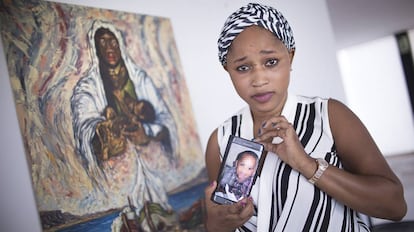From Africa to Algeciras: a mother’s quest to be reunited with her son
A Guinean woman is fighting to get her child back after Spanish authorities put him up for adoption


Mariam Berete, aged 20, has a four-year-old son in Andalusia, but she doesn’t know if she will ever get him back. Her fate, and that of her child, is in the hands of the law.
Two-and-a-half years ago, the child was pre-adopted and now authorities in Cádiz must determine if he would be better off with his mother, from whom he was separated at 11 months when Mariam’s aunt kidnapped him and took him to Spain.
One day, Mariam returned home to find her aunt had gone. She had taken the child with her
That abduction began a nightmarish journey that has taken Mariam thousands of miles, with little more than frustrating encounters with bureaucracy to show for it.
Her case has certain parallels with that of another Guinean, María José Abeng, 19, who gave birth at the age of 14 in a care home in Asturias. Her son Juan Francisco was taken into immediate care by the local social services, who arranged for his pre-adoption by a family in Sueca, Valencia.
Abeng fought a tough legal battle to get her son back, finally persuading the High Court to rule in her favor. With any luck, Mariam’s struggle will have a similar outcome, but Abeng’s case highlighted the complexity of the issues involved when minors are abandoned. Unraveling these complexities can take a frustratingly long time and the conclusion is rarely predictable.
Mariam’s odyssey, which began when she was just 14 in her native Guinea, is testament to her courage and determination. After being abandoned by her mother, she lived with her two sisters and her aunt Fatima in Guinea, with a marriage arranged by her father to her cousin on the cards.
Before the wedding could take place, however, her aunt forced Mariam to come with her to Europe where she had long dreamed of going. Together they traveled by car and bus across Mali and Mauritania until they reached Morocco. Mariam was raped en route on various occasions and fell pregnant. She gave birth in Rabat where she and her aunt had stopped to arrange the crossing to Spain. One day, when the baby was 11 months old, Mariam returned home to find her aunt had gone. She had taken the child with her.
I didn’t want to go to Spain by boat because I was scared of the sea Mariam Berete
Her aunt was crossing the Straits of Gibraltar on one of the illegal ‘pateras,’ or makeshift boats used to make the dangerous sea crossing, and planned to try to use Mariam’s son to persuade the authorities to let her stay when she reached the other side.
“I didn’t want to go because I was scared of the sea,” says Mariam, who is now living in a White Cross Foundation flat in Algeciras. “I knew she was arranging the crossing but I didn’t know the details. After she left, I was alone for a long time.”
With no one and nothing to fall back on, Mariam struggled to survive. A young man offered to help her get work in a pharmacy back in Guinea-Bissau and so she made the journey home and stayed there for a year-and-a-half. She had food and a roof over her head but was haunted by thoughts of her son.
“I decided I didn’t mind taking a boat across the sea after all,” she says. “Then I met a boy. He tried his hardest to persuade me to stay, but eventually he got me a passport and paid for me to travel from Senegal to Morocco.”
From Nador, she managed to get through the police controls and cross the border into the Spanish enclave of Melilla. There she approached the immigration center and explained she was looking for her son. Miraculously, she was then given a temporary residence permit that allowed her to visit the Red Cross in Algeciras where she thought her son might be.
Mariam arrived in Spain on April 29, 2015, with the idea of seeing her son as soon as possible. But there was nothing short-term about the next phase of her quest. Her aunt had given the baby her surname and it was some weeks before she discovered he was living with pre-adoptive parents in Andalusia, a revelation that ended her hopes of a rapid reunion.
If I could speak to the family, I would beg them to give me my son back Mariam Berete
How her son had come to be with a pre-adoptive family became clear during the summer of 2015, when the authorities told Mariam that her mother, Oumou Doumbuoya, now a UK resident, was looking for her.
When Mariam’s aunt Fatima and her son had reached Tarifa, Fatima claimed the baby was hers. The Red Cross was not convinced, however, and reported a potential case of human trafficking. DNA tests were carried out on Fatima and the baby, who was placed in a government care center until the results came through. Meanwhile, Fatima took the opportunity to make herself scarce and fled to France.
The authorities, who were left holding the baby, began to search for his family and found the child’s grandmother in the UK, though not Mariam who was at that time in Rabat. And while they knew her identity, the only clue to her whereabouts was Doumbuoya’s mention of “the north of Africa.”
The grandmother was contacted and the UK social services investigated her suitability as the child’s guardian, but found she suffered from mental health problems, which had already compromised the safety of the two children she had given birth to while she was living in the London suburb of Croydon.
The Andalusian authorities then decided in May 2014 to give the baby to a family for pre-adoption, informing the Guinea embassy and the Foreign Office of their decision.
Mariam has now been in Spain for a year-and-a-half. Shortly after her arrival, a DNA test confirmed that she was the boy’s biological mother. In September 2015, she went to court to try and have the pre-adoption decision revoked.
Mariam says she feels observed and sometimes judged for a situation she has explained ad infinitum to the authorities
Last November, her lawyer lodged an appeal with Cádiz Magistrate, Concepción Carranza who had backed the authorities’ decision for pre-adoption the month before. The appeal froze the pre-adoption process for the family but, until a resolution is reached, Mariam cannot see her son, even on an arranged visit.
“If I could just speak to the family, I would beg them to give me my son back,” she says. “They are not to blame for anything. I would explain to them that I never abandoned my son, that it was all down to circumstances. A mother has a right to be with her child, although I wouldn’t stop them from being with him. I don’t even know if they know I am looking for him.”
Meanwhile, the Andalusian authorities explain that it is in “in the best interests of the child” that Mariam is barred from seeing him. Mariam says she feels observed and sometimes judged for a situation she has explained ad infinitum to the authorities, NGOs, lawyers and now a journalist. “When they look at me out of the corner of their eye, I feel as though they are wondering whether I’m telling the truth,” she says. “Here, I was told that I should always look someone in the eye to know if they’re lying or not.”
Awaiting trial
Mariam Berete is waiting for the court hearing in Cádiz to decide her case. Previously, the Andalusian authorities were opposed to giving her custody of her son. “The mother’s circumstances between December 2012 and June 2015 that prevented her from looking after her son are indisputable,” one government brief states.
Meanwhile, the prosecutor has sent out mixed messages, ruling that the authorities acted correctly in the mother’s absence while suggesting that the re-appearance of the parent should lead to re-examining the child’s family circumstances. Mariam’s lawyer, Rafael Huertas, says that “the most sensible option would have been a simple foster home without pre-adoption. But the regional government takes matters into its own hands and does what it pleases.”
Esperanza Jorge from the White Cross Foundation, who is helping to fight Mariam’s corner, says: “I understand the regional government thinks that she has been an absent mother but imagine a 16-year-old mother with no means of earning a living in Morocco trying to recover a child from the Spanish authorities.”
English version by Heather Galloway.
Tu suscripción se está usando en otro dispositivo
¿Quieres añadir otro usuario a tu suscripción?
Si continúas leyendo en este dispositivo, no se podrá leer en el otro.
FlechaTu suscripción se está usando en otro dispositivo y solo puedes acceder a EL PAÍS desde un dispositivo a la vez.
Si quieres compartir tu cuenta, cambia tu suscripción a la modalidad Premium, así podrás añadir otro usuario. Cada uno accederá con su propia cuenta de email, lo que os permitirá personalizar vuestra experiencia en EL PAÍS.
¿Tienes una suscripción de empresa? Accede aquí para contratar más cuentas.
En el caso de no saber quién está usando tu cuenta, te recomendamos cambiar tu contraseña aquí.
Si decides continuar compartiendo tu cuenta, este mensaje se mostrará en tu dispositivo y en el de la otra persona que está usando tu cuenta de forma indefinida, afectando a tu experiencia de lectura. Puedes consultar aquí los términos y condiciones de la suscripción digital.








































